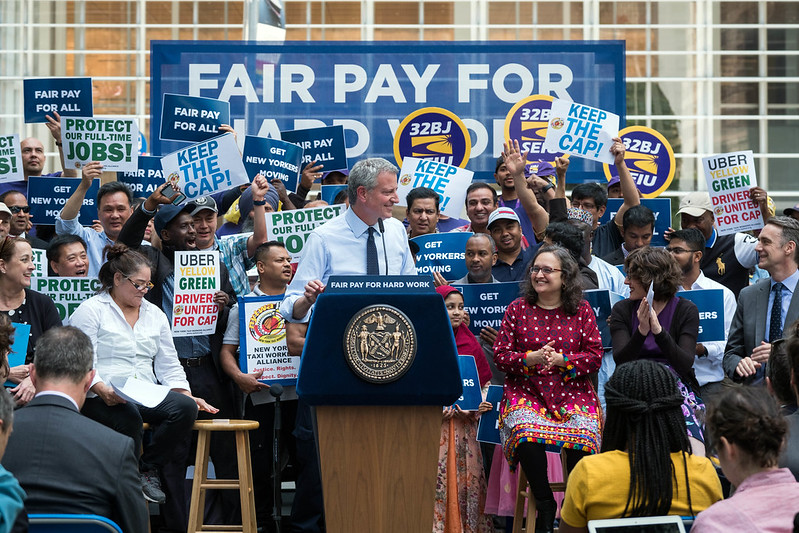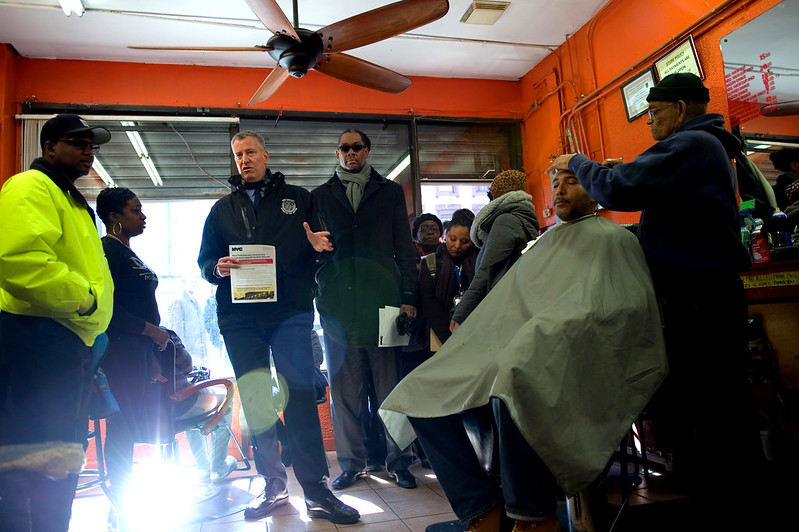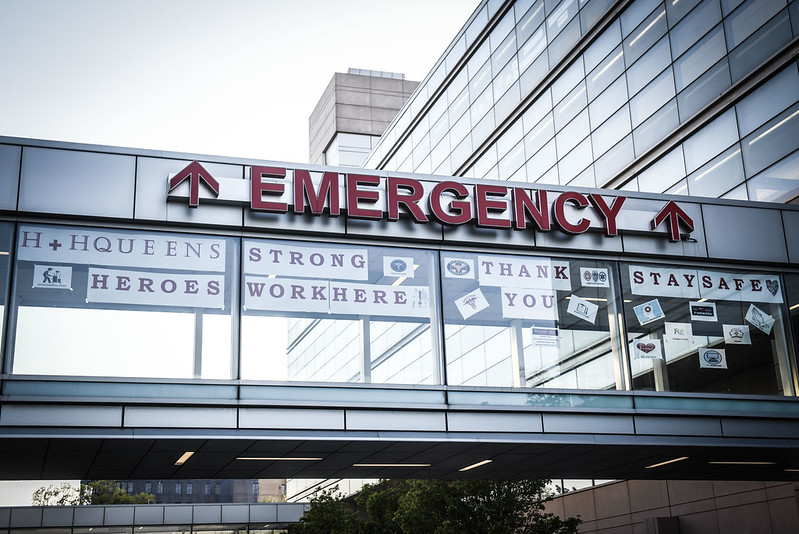Taxi Medallion Owners and Their Families are Still Suffering

The mayor at an announcement (photo: Ed Reed/Mayoral Photography Office)
In February, my family and I discovered a “For Sale” sign on our house. For the last few months, we have been fighting for our home in the middle of a pandemic. For 90 days since then we’ve been living with the fear that our home would be sold and we’d have no place to go.
This has been a deeply traumatic experience for my family brought on by the taxi medallion crisis, predatory lenders, and the city’s failure to act. As the daughter of a taxi driver and a school bus matron, I’ve always known a life of living paycheck to paycheck, one of great instability. Working-class people live in crisis every day, and our city has a moral imperative to aid our communities with bold policy to ensure we can all live a dignified life.
The city’s taxi medallion system limited the number of medallions issued, which created an artificial market — and then that market was exploited to raise revenue. During the Bloomberg and de Blasio administrations, the city made more than $855 million from taxi medallions and collecting taxes on private medallion sales. Meanwhile, they opened the floodgates to Uber and Lyft, which eroded the medallions’ supposed monopoly rights to conduct street hails and led to the bursting of the medallion bubble. For years, taxi drivers in our city have struggled to maintain a living and some can never retire because of our city’s neglect to effectively address the medallion crisis.
In November 2019, my father filed for bankruptcy because he could no longer manage to pay the bloated taxi medallion loan, surcharges, insurance, gas, and repairs on what he was earning as a taxi driver, let alone also maintain other necessary bills. In the spring of 2020, his medallion was seized by Aspire Bank. On February 5 of this year, the United States Bankruptcy Court put the “For Sale” sign on our house — without any advanced notice — and verbally warned us that we had 90 days to reach a settlement with trustees or it will be sold. The trustees of the Bankruptcy Court, one of the only courts open and operating during the pandemic, told us that we need to come up with $250,000 within 90 days.
We knew that our lawyer was not working in the best interest of our family, and we were unsure who we could trust in a time of urgency and desperation. A legal assistance group, and a representative from the mayor's office called me, but after hearing the details of our bankruptcy case, they never called back. We knew time was moving quickly and eventually we paid to retain another lawyer that we found on our own.
During the settlement process, I learned that Bankruptcy Court allows Trustees to use fearmongering and threatening tactics to push lawyers and borrowers to move with urgency without any acknowledgement of the time it takes for families to weigh their options of losing their home or acquiring more debt.
In our case, the trustee became the owner of our home. When selling assets, the trustee gets about 6% or more from the settlement. In the middle of our settlement process, Aspire Bank, the lender who seized our taxi medallion, sold it to another lender instead of renegotiating the sale of the medallion back to us. Because the lender sold the medallion, we had to negotiate a settlement with the trustee who was willing to settle for $150,000.
Although this was not a settlement we could really afford, we knew it would be the last offer before they decided to sell our home. While we are relieved that the bankruptcy court process is over, we are in deep debt.
My family’s story demonstrates the dangers of our city’s neglect. This would not have happened if the mayor had fully adopted the New York Taxi Workers Alliance plan for debt relief, which would restructure medallion loans. Their proposal is supported by Comptroller Stringer, Attorney General James, and Senator Schumer, among others. But, the mayor’s plan is nowhere near what NYTWA is fighting for, it’s not debt forgiveness — it's a bailout for lenders. While the average medallion owner’s debt is $500,000, with industry business down 90%, the mayor’s plan is to have drivers take out $20,000 loans from the city as a payment to lenders.
The city is not just failing taxi drivers. New York state legislators are also negotiating the value of Uber and Lyft drivers as they are currently working on a bill that still allows drivers to be considered independent contractors, and leaked language in the draft bill indicated an attempt to limit actions like "any picketing, strikes, slow downs, or boycotts." Some legislators are still negotiating the value of human lives and dignity against profit margins.
Our fight is not over. We will not stop fighting until the immigrant and working-class communities who kept this city moving during a pandemic are prioritized in policy and aid over banks and corporations and their profits.
I want to thank every single person who has sent love, food, hope and donations to my family. We are so overwhelmed with gratitude for your outpouring during this difficult time. We are not the only family affected by the taxi medallion crisis; too many people have died by or lost a loved one to suicide, lost part or all of their income, their homes and their stability. Like so many others my dad will never be able to retire — out of 6,000 medallion owners, 1,200 are over the age of 62. This is why we chose to share our story and stand in continued solidarity with taxi drivers and their families across our city and beyond.
We need New Yorkers to join us in demanding more. We need the New York City Council to push the mayor to do more. We need the mayor to listen to taxi drivers and adopt the NYTWA plan.
In June, we have the chance to elect a City Council and a Mayor who will prioritize people over profits and treat our essential workers as essential New Yorkers. Get out there and vote for the people who lead with courage.
***
Felicia Singh is a teacher and Democratic candidate running for New York City Council in District 32 in Queens. On Twitter @FSingh_NYC.
***
Have an op-ed idea or submission for Gotham Gazette? Email This email address is being protected from spambots. You need JavaScript enabled to view it.
New York City is Heading in the Right Direction on Saving Small Businesses

A small business visit (photo: Ed Reed/Mayoral Photography Office)
After a devastating year for small businesses, we are heartened to see commitment from Mayor de Blasio and the City Council to dedicate $155 million to small business recovery and job training. In the last year, we’ve lost many businesses and community spaces due to the pandemic and the lack of timely and sufficient action at all levels of government. Now, thanks to the advocacy of small businesses and commercial tenants from across the city, the mayor’s executive budget plan shows some real hope for the businesses that have been able to make it this far.
One exciting part of this investment in economic recovery is expanded funding for the Commercial Lease Assistance Program (CLA). Launched by the Department of Small Business Services in 2018 after sustained advocacy from our coalition, USBnyc, the CLA Program provides free legal representation in connection with commercial leases to underserved small business owners who otherwise cannot afford counsel. Since the beginning of the COVID-19 pandemic, the CLA Program has seen a 10-fold surge in requests for help from commercial tenants who urgently needed advice and representation in approaching lease negotiations with landlords or formalizing unwritten agreements.
In March 2021, United for Small Business (USBnyc) coalition members testified before the City Council small business committee at the preliminary budget hearing. Together, we called for CLA funding to be expanded and baselined. Now that the mayor has announced a proposed expansion in CLA funding, we look forward to working with both the administration and the City Council to ensure this critical program is funded in the final fiscal year 2022 budget, due by July 1, at the proposed level of $5 million and that the program is retained continuously with current providers so that services are not again interrupted.
In future years, we would also want to see that funding baselined and the program scope expanded to serve nonprofit commercial tenants, as well as including litigation in harassment and other cases.
On top of expanded legal assistance, the $100 million small business grant program represents a huge opportunity to help small businesses get through the next few months. Many of the businesses we work with owe tens of thousands of dollars in back rent, if not more, from periods of state-mandated restrictions on activity and capacity. They need financial support to ensure that back rent doesn’t foreclose the possibility of recovery. It is critically important to make sure that these grants are rolled out in a way that is accessible to immigrants and people of color, who have struggled to access assistance throughout the pandemic. Information about the programs should be widely distributed, in multiple languages, to businesses and community-based organizations before applications become available, and a wide range of documentation should be acceptable. This is an opportunity to prioritize New York’s smallest businesses and those who have not been able to access other forms of support.
In the first official debate among leading Democratic mayoral candidates, almost all of them highlighted small business support as a critical piece of the city's recovery from COVID-19, and some acknowledged the importance of rent as a barrier to recovery, along with discriminatory enforcement.
Small business recovery should be part of the discussion for the upcoming debate as well. We hope the next mayoral administration will take bold and comprehensive action to ensure that local economic development is supported.
And in the last year of the current administration, we hope the Council and mayor will take steps to address these long-term challenges of commercial rent and vacancy. This proposed budget represents a step in the right direction, and we are proud to have helped get the city to this point.
***
Abigail Ellman is Director of Planning and Development at the Cooper Square Committee; Olympia Kazi is founding member of the New York City Artist Coalition; and both are members of the United for Small Business NYC Coalition. On Twitter @usb_nyc.
***
Have an op-ed idea or submission for Gotham Gazette? Email This email address is being protected from spambots. You need JavaScript enabled to view it.
Letter to the Editor: Keeping 911 in the City’s Mental Health Emergency Response

Emergency (photo: Michael Appleton/Mayoral Photography Office)
To the editor:
Last week, I joined the final day of training for the new teams who will soon begin responding to 911 mental health calls in East Harlem and Harlem. Through this pilot program - the Behavioral Emergency Response Assistance Division or B-HEARD - mental health professionals will be part of 911 response for the first time in New York City history. It's part of our commitment as a city to treat mental health crises as issues of public health, not public safety.
As we planned our pilot, we consulted with many practitioners and advocates around the city and country, including Correct Crisis Intervention Today in NYC (CCIT-NYC). We looked at health-centered responses in places like Denver, San Francisco, Harris County, and Toronto, as well as the long-running CAHOOTS program in Eugene, Oregon, to develop our model: small teams of emergency medical technicians/paramedics and behavioral health clinicians responding to nonviolent mental health calls that come through the 911 system.
CCIT-NYC has argued against using 911 -- as written in the recent op-ed published by Gotham Gazette: De Blasio is on right track, but mental health response teams need crucial changes to really work -- for the program. But every jurisdiction in the country dispatches their emergency response, including health-centered responses like CAHOOTs, through 911 for good reason.
Importantly, New Yorkers have options outside of 911 for urgent, in-person mental health support. NYC Well can dispatch mobile crisis teams to people's homes within hours. But if New Yorkers need help within minutes, they know to call 911. When they do, B-HEARD will ensure they get the most appropriate response for their needs. Our model builds on other strengths in New York City: FDNY EMS has decades of experience responding to more than 100,000 mental health emergencies each year, and Health + Hospitals has long been the City's behavioral health safety net, overseeing many significant crisis response and emergency psychiatric operations.
The B-HEARD team members themselves also bring impressive experience to this work. In addition to extensive crisis response and de-escalation experience, many team members have lived experience with mental illness and substance use disorders. This was intentional. By layering lived experience on top of tested crisis management skills and rigorous training protocols, we know the teams will be ready on day one.
And they are. The energy on the last day of training was palpable. The new teams are working together seamlessly, equipped with new skills and existing strengths. They are eager to be on the forefront of long-needed change. Everyone involved is looking to learn as much as possible from the pilot program, and use what we learn to inform our approach citywide. As we do, we will continue to learn from advocates, practitioners, community members with lived experience, and other cities embarking on this work.
Sincerely,
Susan Herman
Director, Mayor's Office of Community Mental Health
***
Have an op-ed idea or submission for Gotham Gazette? Email This email address is being protected from spambots. You need JavaScript enabled to view it.




